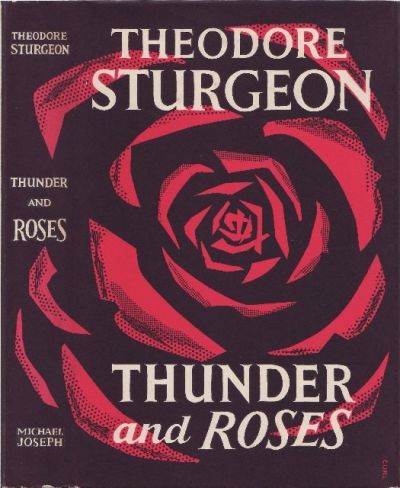It’s sort of sad and amazing at the same time when fictional stories become propehetic. This one basically predicts the Cold War, although I’m sure it wasn’t the only one from the period just after World War II that did so. I can also imagine that the threat of nuclear war was more terrifying back then as the author of the preface mentions. Nowadays we tend to forgo bomb shelters in favor of understanding that most of us will be doomed anyhow. Pete does a good thing, in the end, I guess, by dismantling the power supply, but I’d much rather be Starr Anthim in this situation. Overall, I thought this story was just ok. It’s certainly well-written, but I just didn’t find myself feeling a connection to it.

Thunder and Roses
Theodore Sturgeon
And so after two years we reach the end of Young People Read Old Science Fiction1. I picked Theodore Sturgeon because while I expect none of the Young People have read him, I thought they might at least be familiar with some of the canon he introduced into StarTrek: Pon Farr and the phrase “Live long and prosper.” “Thunder and Roses” was selected because it is, like this final round of reviews, about endings, and the parallel amused me. In its day, “Thunder and Roses” was regarded warmly enough to be collected into a myriad of anthologies and collections. As we’ve seen, past popularity is no guarantee that the current readership will enjoy it.
1: Watch this space for news of the coming sequel: Young People Listen to Old Radio Shows.
For the last story we’re back to slightly strange sounding English and a big cultural divide. The things that are probably supposed to sound mundane just drive home how out of date the setting is. A bit of a tangent: I saw a box of CED carts at a thrift shop the other day, and they work almost as described in the story. Electrostatic video data on a vinyl disc.
It’s a very sad story, about the last sputtering remnants of a people dealing with their mortality. They willfully ignore it, they go mad, they kill themselves, not in any particularly interesting ways. At least one person decides to do something worthwhile with her quickly ending life, trying to keep humanity from being destroyed by angry revanchists is a noble endeavour.
There was at least one interesting question raised by the story. What is the point of retaliation after you’ve been defeated utterly? Is spite really a good reason to try and end humanity?
The story didn’t really draw me in or hold my interest. Sure it was sad and raised an interesting question, but the writing was meh and i didn’t really care about anyone in the story. It didn’t feel like it really went anywhere.
—Jamie
*Oh look, we’ve travelled back in time. And how. Starr Anthim (how do you like that corny, on-the-nose name?) is an early version of a manic pixie dream girl. I mean that in some of the worst ways. Her entire career has been about being appealing to men. Her job as a device in the story is to appeal to the less violent side of the main character. (Hey, he only kills one man for now and doesn’t launch those nukes. Rejoice!) And then once she has accomplished her final task of telling Pete her message, she dies. Mission complete.This not-quite-secular Noah parable comes across as terribly preachy. The exposition in Starr’s monologue doesn’t help.At this point, I’ve read too many post-apocalyptic stories set after a bombing to find anything original in this story. It may be relevant again in today’s palpable recent worries of nuclear war, but it’s marred by the resolution. What does the story say? Nukes are bad. Killing lots of people is bad. The answer: club each other one by one to death. Oh look, we’ve travelled back in time.*
—Mel
I had a really hard time reading this story. I didn’t connect with it at all, and it felt like it took forever to get through.
A story about men killing each other and themselves and everything’s going to die anyways just does not appeal to me at all. It also doesn’t help that the point of view character literally has to struggle to see the only woman present as a person.
And to be fair, the narrative barely treats her as a person. She’s a plot device, and she dies for the emotional journey of the protagonist.
This utter hopelessness might be an accurate portrayal of how people felt at the time, but as someone who essentially missed the Cold War, it’s difficult to imagine and doesn’t make for a story that I enjoyed reading.
